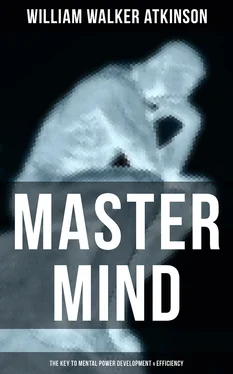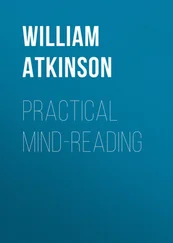The wills of such persons are Slave Wills, subject to the influence, control, and direction of others; although their owners may fondly imagine that they are sound thinkers and possessed of powerful wills. The will processes of such persons are almost entirely what are known as "reflex" activities, requiring the employment of but little powers of judgment and little or no exercise of voluntary control. Do you realize just what this means? Probably not; so you are asked to consider what ''reflex'' activity really is.
The following quotation from a leading psychologist will throw some light on the matter for you. This writer says: "Reflex nervous action is the result of that power resident in nervous ganglia, which often unconsciously causes many muscular and vital movements. The spinal cord is largely made up of such masses of nervous matter, which have sometimes been called 'little brains.' If one were to prick the foot of a sleeper, the sensory nerve at that point would report the fact to one of the lower spinal nerve masses. This ganglion, without waiting to hear from the brain, would issue a command to the motor nerve, and the foot would be immediately withdrawn. Unless the thrust were severe, the sleeper would not awake, nor would he be conscious of pain or of the movement of his foot. This nervous action is called 'reflex,' because, when the sensory nerve conveys an impulse to the ganglion, this impulse is at once, and without the action of the mind, reflected back by a motor nerve. Thus the mind is not only saved the trouble of attending to every little movement, but much time is gained. After the child has learned the difficult art of balancing himself on his feet, walking becomes largely a reflex act. At first, the child must center his whole attention on movements to balance the body. The man can think out the most complex problems while walking, because the reflex nervous centers are superintending the balancing process.
"Few men remember which end of the collar they button on first, or which shoe they put on first, yet the reflex nerve center, if left to itself, has an invariable order in executing these movements. Some vertebrates have much more reflex power than man. The spinal cord in such animals keeps its vitality for a long time after decapitation, and the nerve masses in the cord have the power to set the motor nerves in action, causing muscular contraction. For this reason a decapitated snake will squirm around in a lively manner if its tail is struck. The reason why fowls often flutter so violently after the fatal stroke is because they are thrown roughly down. The sensory nerves report the bruise or jar to a reflex center, which agitates the motor nerves controlling the muscles which would ordinarily move them out of a harmless way. If beheaded fowls are laid carefully on straw or some soft substance, they will scarcely move. But if they should be kicked a moment or two later, they will frequently jump around in a lively manner. If acid is placed on the side of a decapitated frog, the animal will, by reflex action, bring its foot to the spot and try to brush the drop away. Man also has something of this reflex power after death. The pectoral muscle of a beheaded French criminal was pinched, and the right hand was raised to the spot as if to remove the cause of the injury.''
Some may object that we are making too strong a statement when we say that the mental activity of the great masses of people are practically akin to the "reflex'' actions above described. People "think" about what they do, before doing it, these objectors say. Of course "people think"; or, rather, they "think that they think"; but in reality the process of their "thinking" is almost reflex, that is to say it is automatic and mechanical rather than deliberate and controlled by will and judgment. Their thought is usually based upon some suggested premise— some so-called fact accepted through suggestion from others and without verification or duo consideration. Their accepted "facts" are usually found to be those which agree with their likes, feelings, or prejudices, rather than which are based upon careful and unprejudiced investigation. If the facts do not agree with these prejudices and wishes, then "so much the worse for the facts," and the latter are discarded, and eliminated from the so-called "thinking."
And the process of reasoning of these people is likewise lop-sided and unsound in principle. Their so-called "reasons" are but excuses or explanations evolved to justify their decision or action, both of the latter being really based upon the desires, wishes, likes, or prejudices of the person, rather than upon his cool and deliberate judgment. But, you may say, you are now speaking of the person's thoughts, while a moment ago you wore speaking of his will; what do you mean by this? Simply this, good reader, that "thoughts take form in action," and all will actions are based upon thoughts or feelings. Therefore if the person's thoughts are "reflex," then his will action is likewise. We have spoken of the reflex character of the man's actions which were based upon his "thoughts," let us now examine his actions based upon his "feelings." We will soon discover that these too are practically reflex.
It is held by the best psychologists that practically all voluntary acts of will result from the power of desire. This, of course, includes actions resulting from fear, or repulsion, both of which are but negative phases of desire (being the desire "not to experience"). But this does not imply, by any means, that all desires result in will action. On the contrary, in the person of self-control, the greater portion of his desires are inhibited, restrained, controlled, or even killed. The rule is this: The Greater the degree of the will-power of the individual, the greater is his degree of control over his desires. And, as we have seen that the degree of will- power is the degree of the "wakefulness" of the Ego, it follows that the greater the wakefulness of the Ego, the greater the degree of its control over the desires found within its mental realm. As the Ego of most persons is in a state or more or less asleep, it follows that we should expect to find among such people but a slight degree of control of desire, and consequently of their actions resulting from desire; and investigation discloses precisely this kind or result.
The animal, the young child, and the undeveloped man is impelled to act freely upon each and every desire or feeling that manifests within his mental being; he is restrained from such action only by fear of consequences. It is related of certain savage tribes that it is unwise to issue them several days' rations when starting on a journey, because they will sit down and eat the entire ration at one meal, being unable to resist the inclination, and being unable to control the appetite of the moment in the interest of the certain hunger of tomorrow, and the next day, and the day after. We smile at this, but how many of us are quite as foolish when we sacrifice the success of tomorrow and the next day upon the altar of the satisfaction of the desires of the present moment. The desire-action of the Slave Will is almost purely reflex and under no voluntary control; while that of the Master Will is under great voluntary control and direction. We shall see more of this when we reach the place in this book in which the subject of Desire is considered in detail.
Some philosophers have sought to convince us that Man is never more than an automaton—a creature of reflex activities—having no freedom of choice, will, and action. And so strong do they make their one side of the case, that many have accepted their reasoning. But the truth is grasped only when we consider the other side of the ease; then the real truth is seen to rest between the two extremes. It is seen to be true that in the cases of the masses of the race—the persons of the Slave Will— there is little or no real freedom of action, but rather there is an almost automatic response of will-action to desire-motive. But, on the other hand, in the case of the advanced few of the race, the true individuals—the persons of the Master Will— there is secured the longed for freedom of action, by means of the control of the desire- motives. In fact, this control is one of the leading characteristics of the Master Mind.
Читать дальше












